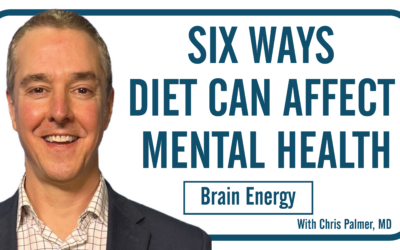Science
Mental Health Labels Aren’t Causes: It’s Time to Get Curious Again
One of the most frustrating and overlooked problems in psychiatry is the way diagnostic labels are too often mistaken for causes. It’s a subtle but profound error that shapes the entire field. Take these common examples: “She has hallucinations because she’s...
Treatment-Resistant Depression and Suicidal Ideation: A Metabolic Disorder?
Major depressive disorder (MDD) remains a leading cause of disability worldwide. For those with treatment-resistant depression (TRD), the stakes are even higher. A recent study by Pan et al. (2023) identifies a strong association between metabolic...
Now on YouTube! Six Ways Diet Can Affect Your Mental Health
Discover the powerful link between diet and mental health in this deep dive. It’s not nearly as simple as most people think. Learn six different ways that your food choices can impact mood, energy, and even severe mental health conditions. From nutrient deficiencies...
Does Mental Health Treatment Work? It Depends on Your Definition of “Work.”
When asking whether mental health treatment works, it’s essential to begin by defining what “work” actually means. For many, it’s about finding relief from overwhelming symptoms. For others, it’s about regaining a sense of purpose, building meaningful relationships,...
Diet and Mental Health: Untangling Complex Mechanisms
Diet’s Influence Goes Beyond “Healthy Foods for Your Brain” The connection between diet and mental health is undeniable, but it’s far more complex than simply eating "healthy foods for your brain." Diet influences mental health through diverse mechanisms—ranging from...
Addressing Veterans’ Health Through Integrated Mental and Metabolic Health Care
This Veterans Day, as we honor the service and sacrifice of military veterans, we must also confront the unique and complex health challenges they face after returning to civilian life. Veterans often begin their service with strong physical and mental resilience, but...
Autism: Disorder, Disability, or Just Different?
Autism spectrum disorder (ASD) continues to spark debate—not only among clinicians but also within the autistic community. Is autism a disorder requiring treatment, a disability that calls for accommodations, or simply a different way of being in the world? This...
Chronic Sinus Infections and Mental Health: A Two-Way Street
Chronic sinus infections, medically termed chronic rhinosinusitis (CRS), affect roughly 12% of the U.S. population, manifesting as a persistent inflammation of the sinuses for over 12 weeks. Beyond the congestion, facial pain, and difficulty breathing, a...
Neurodegeneration and Metabolism: Seeing Beyond Symptoms to Root Causes
Neurodegenerative disorders like Alzheimer’s disease (AD), Parkinson’s disease (PD), amyotrophic lateral sclerosis (ALS), and Huntington’s disease (HD) are typically distinguished by their hallmark clinical features—memory loss in Alzheimer’s, motor difficulties in...
Rising Mortality in the US: The Role of Chronic Disease and the National Conversation on Health
The United States is facing an alarming rise in mortality, and it’s not COVID-19 driving this trend. While the pandemic initially captured headlines, a deeper health crisis has been unfolding for decades—non-COVID deaths, especially from chronic diseases, are surging....











